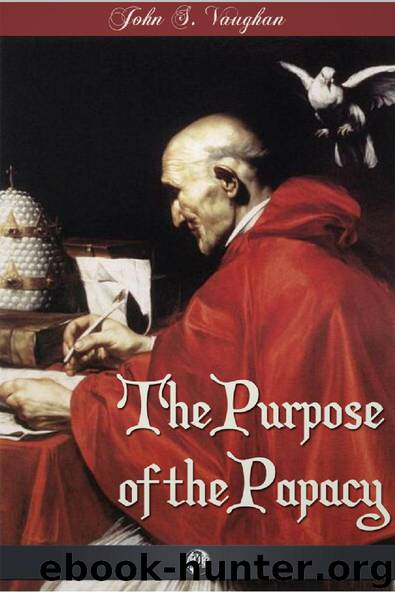The Purpose of the Papacy by John Stephen Vaughan

Author:John Stephen Vaughan
Language: eng
Format: epub
Tags: history, roman catholic church, catholicism, the pope, hierarchy, religion
ISBN: 9781781669112
Publisher: Andrews UK Limited 2012
Published: 2012-06-20T00:00:00+00:00
CHAPTER VI.
THE POPE'S ORDINARY AUTHORITY.
1. When the Holy Father speaks ex cathedrâ, and defines any doctrine concerning Faith or Morals, we are bound to receive his teaching with the assent of divine faith: and cannot refuse obedience, without being guilty of heresy. By one such wilful act of disobedience we cease to be members of the Church of God, and must be classed with heathens and publicans: "Who will not hear the Church, let him be to thee as the heathen and the publican" (Matt, xviii. 17).
But the Holy Father rarely exercises his prerogative of Infallibility, and therefore the occasions of these special professions of faith occur but seldom - not once, perhaps, during the course of many years.
2. What then, it may be asked, is the proper attitude of a Catholic towards the Pope, at ordinary times?
For a proper understanding of the answer, it may be well to remind the general reader, that the law of God enjoins obedience to all lawfully constituted authority; whether ecclesiastical or civil, and whether Infallible or not: further that the Pope, whether speaking ex cathedrâ or not, is always our lawful superior in all matters appertaining to religion, not only as regards faith and morals, but also as regards ecclesiastical order and discipline. His jurisdiction, or authority to command in these matters, is supreme and universal, and carries with it a corresponding right to be obeyed. He is the immediate and supreme representative of God upon earth; and has been placed in that position by God Himself. And since the Primacy is neither in whole, nor even in part of human derivation, but comes directly and immediately from Christ, no man or number of men, whether kings or princes or individual Bishops, nor even a whole Council of Bishops, have any warranty or right to command him in religious or ecclesiastical concerns.[9] The Council of Florence declares that: "To him, in Blessed Peter, was delivered by Our Lord Jesus Christ the full power of ruling and governing the Universal Church". Now this "full power" accorded by Christ cannot be limited except by the authority of Christ. Though the Pope is not the Sovereign of all the faithful in the temporal order, he is the Sovereign of all Christians in the spiritual order. If then - and this is admitted by all - we are bound in conscience to obey our temporal sovereign and magistrates and masters, and must submit to the laws of the country, so long as they do not conflict with higher and superior laws, such as the Natural Law and the Revealed Law, with still greater reason are we bound to obey our spiritual Sovereign and the laws and regulations of the Church.
3. To object that the Pope may possibly make a mistake when not speaking ex cathedrâ though true, is nothing to the point. For civil governments are far more liable to fail in this respect, and as a matter of fact, do frequently abuse their power and pass
Download
This site does not store any files on its server. We only index and link to content provided by other sites. Please contact the content providers to delete copyright contents if any and email us, we'll remove relevant links or contents immediately.
The Art of Coaching Workbook by Elena Aguilar(51160)
Trainspotting by Irvine Welsh(21638)
Twilight of the Idols With the Antichrist and Ecce Homo by Friedrich Nietzsche(18621)
Fangirl by Rainbow Rowell(9228)
Periodization Training for Sports by Tudor Bompa(8252)
Change Your Questions, Change Your Life by Marilee Adams(7758)
This Is How You Lose Her by Junot Diaz(6877)
Asking the Right Questions: A Guide to Critical Thinking by M. Neil Browne & Stuart M. Keeley(5757)
Grit by Angela Duckworth(5604)
Red Sparrow by Jason Matthews(5465)
Paper Towns by Green John(5177)
Room 212 by Kate Stewart(5105)
Ken Follett - World without end by Ken Follett(4722)
Housekeeping by Marilynne Robinson(4436)
The Sports Rules Book by Human Kinetics(4379)
Papillon (English) by Henri Charrière(4262)
Double Down (Diary of a Wimpy Kid Book 11) by Jeff Kinney(4261)
The Motorcycle Diaries by Ernesto Che Guevara(4089)
Exercise Technique Manual for Resistance Training by National Strength & Conditioning Association(4060)
